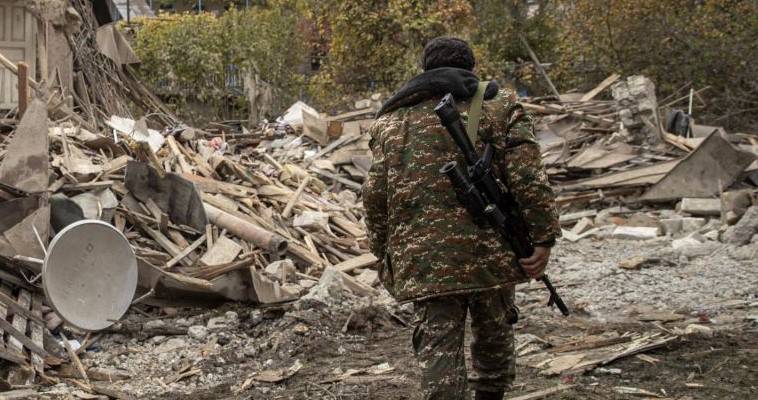Themis Tzimas: Nine conclusions from the defeat of Armenia – The consequences for Greece
11/11/2020
In a previous article we talked about the importance of Armenia’s non-defeat in Nagorno-Karabakh (Artsakh). Unfortunately, amid silence from the international and domestic media, Armenia’s defeat was confirmed, leading to its capitulation on unfavorable terms. This development can prove to be internationally catalytic. It is worth focusing on a few key points that are eloquent:
First, both the Prime Minister of Armenia and the leadership of Artsakh justified the capitulation, placing the burden on the military leadership, arguing that they no longer had the strength to continue the war and that the capital of Stenapakert was in danger. If this is the case, questions arise as to Armenia’s military preparations: was it technologically prepared for Azerbaijan and Turkey? The question, at a time when Artificial Intelligence and unmanned weapons systems play a key role, is crucial for Greece as well.
We already know from the attack on Aramco’s facilities in Saudi Arabia that a combination of missiles and drones can deplete or even neutralize anti-aircraft defenses. They can also deal overwhelming blows to the Army. Obviously, Armenia was not ready for this war. Will Greece prepare, or will it continue to hope for the favor of foreign states, at the critical moment?
In addition, even if in certain fields, the combat capability of Ankara’s Islamist mercenaries is low, on the one hand they learn quickly, on the other hand they offer a significant additional numerical advantage at a relatively low cost. How do we prepare?
Armenia’s defeat is also a victory for Turkey
Second, Turkey has again followed the “I create a problem or exacerbate it so I can be part of the solution” tactic. This paid off for Turkey, once again. Although there is tension and controversy over the presence of Turkish “peacekeeping forces” in Nagorno-Karabakh, as nothing such is foreseen in the ceasefire, it is becoming clear that Turkish forces are “setting foot” in the Caucasus and becoming part of a solution, no matter how precarious.
Third, Turkey will be able to vary its pressure on Armenia and Russia with multiple benefits: Azerbaijan is basically passing under Turkish influence. Turkey may try to make Azerbaijan join NATO in the future. In addition, Turkey is objectively becoming the spearhead in the policy of maximum pressure on Russia.
Thus, using the anti-Russian sentiment of the Democrats in the US will conditionally upgrade its importance to Washington, even given Biden’s dislike for Erdogan. For the above two reasons, however, at the same time, Turkey is becoming very important for Russia. The two states “border” in almost every conflict. If Russia has to negotiate with anyone – as long as the West does not do so due to anti-Russianism – it is Turkey, otherwise, it will face NATO.
Russia and Turkey
Fourth, Russia has limits and interests. The Greek establishment, bound by the prevailing anti-Russianism, is quick to describe a Russia that betrayed Armenia. It is the other side of the same coin (called nonsense) of those who dream of a “blonde race,” as prophesied by some saints. Russia, and in particular President Putin, has shown that it does not resort to war except when very specific Russian interests are threatened.
Russia entered the war in Syria four years after it began, with Western elites and Erdogan on the outskirts of Damascus and their shells on the main roads. In Libya, it did not veto the Security Council. In Ukraine, it did not react to regime change and only acted when it feared that the whole of Ukraine become anti-Russian. It does not want a war with a NATO state and especially with Turkey.
It is already involved in several wars, under conditions of sanctions against Russia, pandemic and falling oil prices. Russia’s endurance is not what the USSR once had. In any case, the Russian leadership will only test them when it has no other choice. Until then it will save time. Hence it remained to what was required by the respective treaty: defense of Armenia only. That he had an obligation to do and that he eventually did.
In addition, we must keep in mind that the Prime Minister of Armenia started out as friendly to the West, not to Russia. The big picture for Russia is the USA and therefore it is important to avoid a heated confrontation with the Americans, but also to reaffirm its power to its allies. It did it with Belarus and now it is trying again with Armenia. It is neither easy nor pleasant.
Russian mistakes
Fifth, Russia makes mistakes like everyone else. The non-veto of the Security Council resolution that led to the overthrow of Gaddafi, the failure to save the Cypriot economy, and the tolerance of Turkish intervention in the Caucasus are bad for Russian interests. Erdogan may, sometime, leave. Turkey will stay, and through Turkey so will NATO. There are various scenarios that touch on conspiracy theories.
Until they are proven, let’s assume that Russia was taken by surprise in its soft underbelly. It will pay a price for this and will have to reverse it before it finds itself with NATO encircling it permanently from all sides and with its allies insecure. In other words, it must immediately expel Turkey from the Caucasus. There are precedents in the diplomacy of both the USSR and Russia that show that it knows how to save time. For now, though, that sounds very dubious. Of course, it seems to have secured custody of Armenia and much of Artsakh. However, these are not enough.
Sixth, Biden’s election and Trump’s difficult surrender are exacerbating tensions. Everyone is rushing to secure and seal their territories from a possible US recovery effort. Turkey is doing its best – warning bells must ring in Greece – but in this case, Russia also wanted to end this war as soon as possible, before the US starts intervening.
Seventh, statements of support from Western countries are not even worth the paper spent printing them. What was Macron’s help to Armenia? What was the help of the EU or the US with the Armenian lobby? The initially pro-Western Prime Minister of Armenia Pasinyan was forced to turn to Russia. Apparently not a single rocket was sent from the participants in the allegedly emerging front against Turkish revisionism. First and foremost is Israel, which gave Azerbaijan and therefore Turkey everything they needed.
Greece-Turkey
Eighth, the relationship between Greece and Turkey is depressing, in general and in this case as well. Greece is considered a given and indifferent, and is told for the umpteenth time by the real Prime Minister, none other than US ambassador Pyatt, to set as a common goal, for Greek foreign policy and the foreign policy of the USA, for Turkey to stay in the western “fold”. In other words, on Greece and its rights, the domestic establishment serves the interests of other states. Turkey, on the other hand, with all its problems, is eyeing global powers. What are we really doing about the Caucasus, Syria, Iraq, Libya, etc.? We are waiting for Biden to save us, as we initially expected from Trump.
Ninth, for the time being, a front against Russia will be built and not against Turkey. They can not both happen at the same time. The anti-Russian front cancels Turkey’s restraint. In order to limit Turkey, Russia, and its allies must have a strategic, partnership relationship with at least France and Germany, but in fact with the United States.
As long as this does not happen, Turkey, even if it becomes the “sick man of Europe” again, although it is far from it, and the stakes will rise. A very bad day dawned for Armenia, for Russia, for international peace, but also for Greece. Let us try not to turn the defeat of the Armenians into a prelude to disaster.





